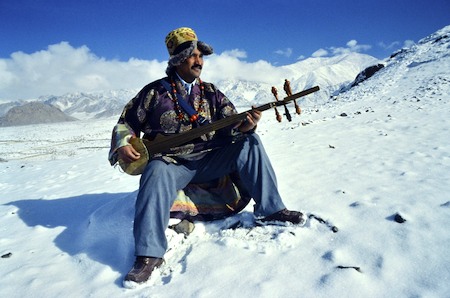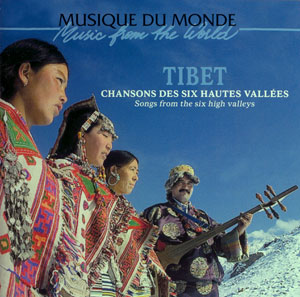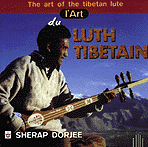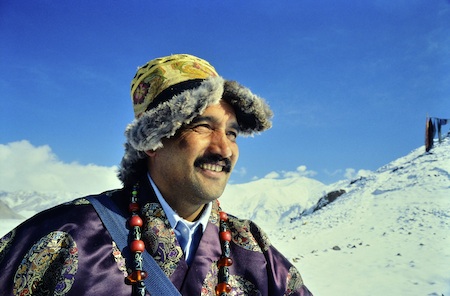Sherap Dorjee

A renowned musician in the Tibetan community in Ladakh, Sherap Dorjee played a major role in this project, both as an artist and as cultural adviser on music issues.
He sings and performs several instruments in the collective album Tibet, songs from exile, and we made two albums dedicated to his music, Songs from the Six High Valleys and The art of Tibetan lute.
Songs from the Six High Valleys

Sherap Dorjee & Shang Shung Da Yang
Editions BUDA Musique (3016784)
Sherap Dorjee and his group Shang Shung Da Yang - all tibetan refugees based in Ladakh - reveal to us the little known melodies from the high valleys of Thot Tso Yul Duk, in Western Tibet.
A rare opportunity to hear these peasant songs impregnated with an ancient mountain poetry...
The art of Tibetan lute

Sherap Dorjee
Editions ARION (ARN 605558)
Sherap Dorjee, tibetan musician exiled in Ladakh (India), presents in this record the various styles of tibetan lute music, mainly the danyen of Central Tibet and the kovo of Western Tibet.
Biography

In the Six High Valleys
Sherap Dorjee was born in 1964 in the village of Kharak, a peasant communityof about twenty houses nested in a Western Tibetan valley. More precisely in the Thot Tso Yultuk, the "Six Haigh Valleys", the highest inhabited valleys in the world... Sherap grew up in this village surrounded by a river, a forest and terrace fields in which barley, radishes and potatos were grown. Little herds of animals were being taken care of - which for some of the villagers implied spending the summer months in the high pasture land.
Sherap's father, Dhundup Dorjee, was famous in the area. Besides being a talented blacksmith, goldmsith and hunter, Dhundup was the most renowned musician in the valley. He could play any instrument. During festive gatherings, he was the one playing the kovo lute for the gorshey dancers, as well as the drums for karr and tsey dances. When the community hosted a prestigious guest, at the sound of dama drums and suna oboe, it was him again, with another villager. On the morning of new year's day, he climbed on the monastery roof to play the drum in order to appease the gods. For his own pleasure, he also played the lingbu flute and the piwang fiddle. Immersed in this musical vitality, little Sherap absorbed his father's talent, whom he never stopped admiring. At the time, Dhundup had no idea that, later, his son would carry this local music way beyond the borders...
Exile : music goes on
In 1970, fearing the CHinese authorities were about to conscript him in the People's Liberation Army, Dhundup decided to escape with his family to India, where the Dalai Lama had been residing for more than ten years.
This is how, at the age of nine, Sherap Dorjee arrived in Ladakh, himalayan region of Tibetan culture which used to be a part of the Ngari kingdom. He joined the newly founded Tibetan school of Choglamsar, before leaving for Nepal where he learned various manual skills in a training center. He practised these skills professionnaly in Dharamsala, the Tibetan capital-in-exile, in Northern India. He returned to Ladakh in 1987 where he was hired as a teacher in the professional traing center of the Tibetan school.
From the begining of this new life in exile, Sherap was involved with music. He started in the school, as a dancer in the cultural commitee and a musician in the flute fanfare. Privately, he started to play an instrument which had become extremely rare in exile : the kovo lute, the king-instrument of the Tot Tso Yultuk valleys, and which his father Dhundup was a renowned player. Since he had passe away, young Sherap take up his father's torch by himself, together with Pema Thinley, a schoolmate who also came from Tot Tso Yultuk : it was Pema who acquired the instrument on which the two boys practiced and learned. (Even though Pema eventually quit playing music as he became an adult, Sherap didn't forget these first steps together, and invited him, twenty-five years later, on the recording of the album "Songs From The Six High Valleys").
During his years in Nepal and Dharamsala, Sherap kept exploring music : besides organizing dance troupes, he learned new instruments such as the dranyen lute, the piwang fiddle and the gyumang zither.
A music career
In 1992, the Choglamsar school, in the absence of a music teacher, requested Sherap to prepare the group of students who were going to represent the school in Dharamsala, at the celebration of the 25th anniversary of the insitution, for which an inter-school dance and music competition was set up. All the Tibetan schools in India had to perform three acts in front of the jury. Sherap's group won the forst prize for the three categories ! After this spectacular success, Sherap was appointed as a music and dance teacher in the Choglamsar main school, a position he still holds.
His work mainly consists in teaching Tibetan patriotic songs to children as well as training the most gifted further : they learn the art of dance, taking the shape of choregraphies designed for public performances, as well as music, based on the chamber orchestras once popular among the aristocracy of ancient Lhassa.
Among his students, he is most proud of Sontsa, a trio of young girls : Tenzin Dekey, Tsesum Dolma and Dolma Tsering. Despite their young age, these three talented teenagers are already quite experienced, haveing performed for various audiences, from the Tobetan community to foreign tourists, as well as the Indian army and gigs for ladakhi radio and television...
When Sherap made the album "Songs from the Six High Valleys", he formed a group, Shang Shung Da Yang, with his childhood friend Pema Thinley and three women also originating from the valleys of Thot Tso Yultuk : Sonam Zangmo, Pema Yangzin and Norbu Dolma. They are among the few Tibetan refugees who could live as farmers until the late-90s : this is how they got to master a rich repertoire of peasant songs, which they perform with grace and delicacy.
Music takes most of Sherap's time : daily classes, activity for the Culture Commitee, rehearsal for dance competitions, private tuitions, occasional performance for the radio or a Ladakhi singer, as well as many other public performances such as the Ladakh Festival, the New Year, the welcoming of the Dalai Lama, etc...
Meeting with Boris Lelong, from Altamira association, led to the making of two albums under his name : "The art of Tibetan lute", a presentation of the differents lutes of Tibet, followed by a more ambitioous project dedicated to his home province, Thot Tso Yultuk : "Songs from the Six High Valleys" - a project that means a lot to him.
He played a considerable role in the making of the album "Songs from exile", both as a singer and musician (kovo and dranyen lutes, lingbu flutes, jerrycan), alone or with his groups Shang Shung Da Yang and Sontsa, and also as a cultural adviser, feeding this collective project with his deep knowledge of Tibetan music.